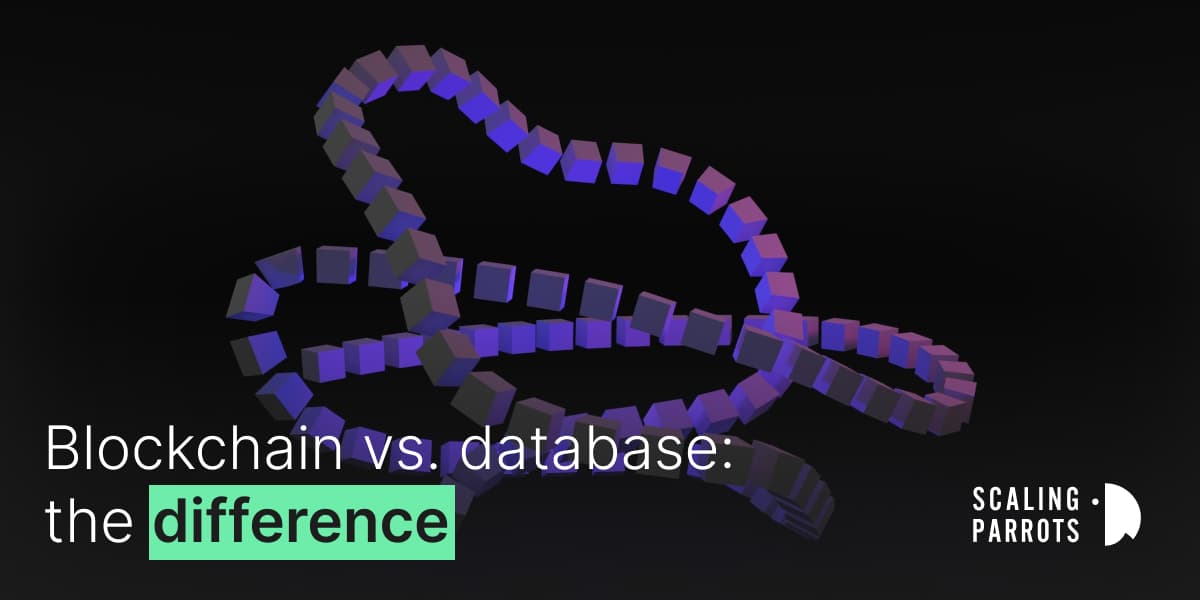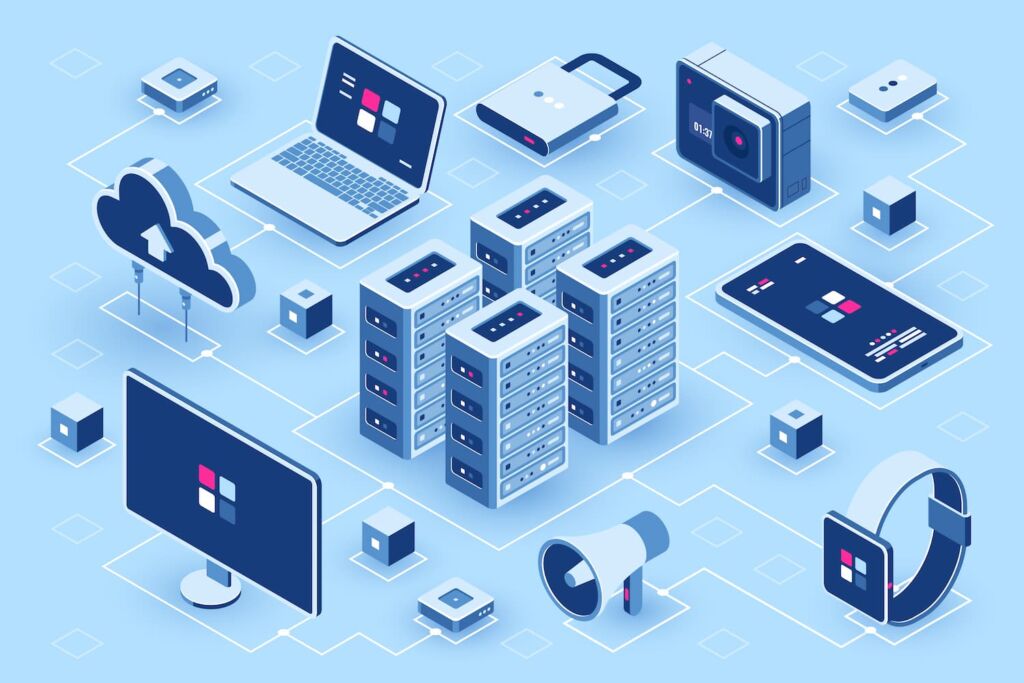
Blockchain and Database might seem similar if you are a newbie in the computing industry. However, there are several notable differences between the two. Some persons consider Blockchain as a form of Database. Others call it an advanced or distributed database.
Blockchain is more than just a database. There are notable differences between the two. This article will provide a detailed comparison between Blockchain and Database. We will also examine which is better, Database or Blockchain. Learn more below!
What is database?
Database refers to a set of organized data stored and accessed electronically. Small and large Databases are stored differently. While a small database is stored on the file system, the large Database is hosted on computer clusters or cloud storage.
Computer databases generally store data records or files containing information such as sales transactions, financial records, customer data etc.
The most common use of a Database is for storing, maintaining and accessing all types of data. The Database accepts information on people, places, or things, including historical records. The information gathered is organized in one place to be observed and analyzed.
In addition to the storage and accessibility of data, Databases can also be used in business to make informed decisions. Here are more ways organizations use Database:
- Improve business procedures
Various companies collect data about business strategies and processes and information regarding sales, customer service and order processing. They analyze this information and employ this information, expand their business and also grow revenue for the company.
- Keep track of customers and customer service
As a Database is used to store information about people, including customers, they can learn more about customers‘ needs. This way, they can also store customers’ names and know how best to improve their customer service.
- Secure personal health information
A database can also be used to store medical records. That is why healthcare providers employ databases to secure personal healthcare data. As such, they can inform and improve patient care.
- Storage of personal data
Just as a Database can be used to store personal health information, one can store other personal details. For instance, an individual can use personal cloud storage to store media files and other personal files.

How does database work?
A Database works with a database management system. The database management system allows users to create and manage a database. With a database management system, users can create, read, update and delete in a database.
Database management system work as an interface between an end-user and a database. Generally, database management is in charge of managing data, and the database engine allows data manipulation.
What is Blockchain?
Blockchain is simply a system in which a record of a transaction is made in cryptography and is maintained across various computers linked in a peer-to-peer network. It is in the form of a digital ledger, used in recording information that is duplicated and automatically distributed across various computer networks.
Each transaction is recorded in a block, and each block in the chain consists of several transactions. When a new transaction occurs, a record of such transaction is added to every participant’s ledger.
How does Blockchain work?
One of the major functions of Blockchain is to enable digital information to be recorded and shared but not edited. Information is decentralized, making it immutable, as ledgers or records of transactions cannot be altered, deleted or even destroyed.
Because of this function, Blockchain is also referred to as a distributed ledger technology (DLT). As Blockchain allows data to be distributed in several networks, it creates redundancy and maintains the fidelity of the stored data.
So if someone tries to alter a record stored in one Blockchain, the other nodes can’t be altered. If one tampers with one record, all other nodes would automatically cross-reference each other and easily identify the node with incorrect information. This ensures transparency and trust.
Uses of Blockchain
Blockchain can be used in many areas and industries. Its application covers a wide range of industries due to its relevance and many benefits. The idea of Blockchain was initially to solve the issue of double-spending problems associated with digital currencies. However, today its application cut across finance, business, politics, health etc. Below are the common uses of Blockchain:
- Blockchain is used in money transfers. With Blockchain, transfers that take days require only a few minutes to be accomplished.
- Many companies employ Blockchain in financial exchanges. This is because Blockchain allows for faster and less expensive transactions.
- Blockchain is also used in insurance using smart contracts. Smart contracts can offer better transparency for customers and insurance providers.
- Since real estate involves a lot of paperwork, Blockchain is used to record real estate deals and can offer more secure and accessible records.
- Apart from occupational use, Blockchain can also be used to store personal information.
- The gambling industry also employs Blockchain. This offers users several beneficial gains, such as fairness and transparency.
Advantages of Blockchain
- Security
Blockchain boast of security and trust, as this is achieved through decentralization. How is this? Firstly, in Blockchain, new blocks are always stored linearly and chronologically. As such, they are always included at the end of the Blockchain.
After a block is added directly to the end of the Blockchain, it is difficult to alter the contents of the blocks. It can only be altered if the majority network has reached the consensus to do so.
- Immutability
Blockchain employs a system that supports immutability. This means that it is impossible to erase or tamper with recorded data. Traditionally, data do not possess immutability, as it uses the create, read, update and delete method(CRUD). This model allows for easy replacement and erasing of data. This makes data prone to manipulation. But Blockchain solves this problem.
- Transparency
Since Blockchain uses a decentralized network, any member of the network can verify data recorded into the Blockchain. As such, the public can trust the network. This is different from the traditional Database, which does not support transparency.

Advantages of database
- The database ensures minimized data redundancy
Structured database management has a feature that prevents the input of duplicate records in the Database. For instance, if we give the name of the same student appearing in different rows, the duplicate data will be deleted.
- Simplicity
A Database has the unique feature of being simple. Database management system offers a simple and clear, logical picture of data. Operations such as deletion, modification, insertion or creation of files are quite easy to find and implement.
- Accessibility
In a Database, the organized and centralized nature of the data ensures accessibility. The database management system ensures the production of quick answers to database queries. This makes data access faster and more accurate. Also, since data is in a central authority, one can easily access it by asking permission from the database administrator.
What is the difference between Blockchain and database?
- Data structure
One of the major differences between a conventional database and a Blockchain is how data is structured. For Blockchain, information is collected in a group known as blocks. These blocks hold information about the transaction. The blocks have a specific kind of storage capacity and, when filled, are closed and linked to the previously filled block. This forms a new chain of data called Blockchain. Any new information that follows after the first transaction is added to the block. The information is then compiled into a newly formed block, soon to be added once the block is filled. In contrast, a database data structure is in tables. While Blockchain, as its name suggest, is stored in blocks, the Database is in tables. The data is organized in a structured table consisting of rows and columns. Each row is called a record, and a record refers to an object or entity. So it is right to say that a database is a collection of records. A file corresponds to a specific column in the table. This represents a single value for each record. - Data centralization/decentralization
Another notable difference between Blockchain and Database is the type of network system. Database employs a centralized network, while Blockchain is decentralized. In Blockchain, decentralization is the transfer of control and decision from a centralized to a decentralized network. The decentralized nature of the Blockchain network aims at reducing distrust and deterring the ability to hold authority over the functionality of the network. In a decentralized Blockchain network, each computer network possesses a copy of the same data. This is in the form of a distributed ledger. In Database, a centralized network is used. Here, the Database is stored in one location only. All data is managed and modified in that same single location. Thus, the location is commonly a database system or a centralized computer system. The centralized location of the data can be accessed through an internet connection, like a Local Area Network (LAN) or Wide Area Network (WAN). This type of data storage makes it easier to access and coordinate data, unlike the decentralized system of Blockchain. Also, centralized Databases involve low data redundancy, as all data is stored in a single place. - Administration
The third difference between a Database and a Blockchain is the system of administration. For a Database, there is a need for a database admin or database administrator to handle the stored data. Whereas in Blockchain, no administrator is required. In this light, for a database, when a modification is needed, the authorized users have a copy of the data. Even the modification of one copy does not affect the master copy. - Record pattern
Databases record only present information. They do not keep traces of previously recorded information. This is quite different in Blockchain. Blockchain keeps records of both current information and traces back previous transactions. Blockchain has the ability to create databases that contain histories of themselves. That means they keep on growing and expanding to an archive of their own history. - Form
A Blockchain can be considered a form of Database but not every Database can be considered a Blockchain. This is because a Blockchain is a kind of Database, but it is a digital ledger. A digital ledger stores information in blocks. In contrast, the traditional Database is just a kind of data structure used for storing information.
Which is better, Blockchain or database?
Having considered what a database and a Blockchain are, including their advantages. Now, which one is better, Blockchain or Database?
To consider which is better, we need to review their features and functionalities. In terms of performance, Blockchain is quite slow. In fact, it is compared to the internet of the ’90s. People say it is a new technology and is not properly optimized yet, but in due time it will speed up, just like the modern internet.
Blockchain is slow because when processing data, it has to ensure signature verification, consensus mechanism, redundancy etc. Database, on the other hand, is not as slow as Blockchain. Therefore, in terms of speed and performance, Blockchain can’t compete with Databases.
Database has been around for a decade and has witnessed many modifications. So it performs its regular duties and still maintains speed.
However, when it comes to security and maintaining transparency, Blockchain is ideal. This is because it operates on a decentralized network. Though the traditional Database claims to be secured, it has some loopholes and is not immutable. It can be accessed, and all information can be easily hacked since it is under centralized authority.
In general, the choice of which is better between Blockchain and a Database depends on what you need them for.
First, you need to identify what works best for you or what is more important. Do you need disintermediation, security, and robustness to store data? Then go for Blockchain. If you require performance and confidentiality more, then Database works fine. So if trust is not an issue, the traditional Database is better than Blockchain.
Conclusion
Blockchain and Database each have a unique function in data storage. While Blockchain is great with transparency, trust, security and traceability, Database is great at accessibility, performance and speed.
Determining which is better largely depend on the need of the user in relation to the functionality of the two storage system. So, to make a wise decision, consider the different features, advantages and system of operation.
See you soon,
Scaling Parrots
